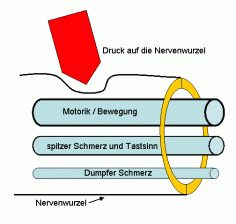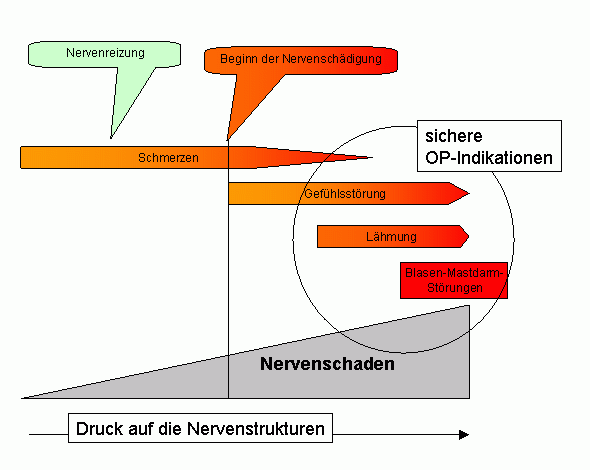You are here: Home » Therapies » Indikations for surgery
When surgery?
Every single operation needs to be evaluated in advance. If the reasons for an operation overcome the disadvantage we should not hesitate anymore. Our aim is to share all the information, advantages and disadvantages of the disease or an operation with you to enable you to make the decision.
We can characterize the reasons for an operation in 2 different categories:
Absolute indication for an operation:
There is no other way of treatment possible. We must operate
Relative indication for an operation:
There are other possibilities like a conservative therapy. If an operation would enhance or reestablish your quality of life it would also be an relative indication.
Nerve root
Between 2 vertebral bodies there are two small channels where nerves leave the vetrebral channel on each side. The single nerve fibers are covered by the cord skin. The nerve bundle is made up of fibers which transmit information to the brain (sensory) and fibers which transmit information from the brain or the central nervous system back to the muscles (motor). If there is any pressure on the nerve root this will at first activate the small and sensible pain fibers. If the pressure increases or can’t be released this could lead to damages which is characterized by numbness in the beginning but may lead to paralysis. The pain fibers do not work anymore: The pain erases, the paralysis comes!
Further nerve damages
In the graph you can see an increasing nerve damage which can be caused by a slipped disk. A retrograde pain can be a sign for an increased damage because the nerve is not able to transmit any information ( even not the pain). (No brain, No pain)
We have to differentiate once more:
Emergency:
This applies if the patient suffers from rectal disorders or disorders of the bladder. If the operation gets postponed this could lead to severe paralysis or paraplegia.
Urgent operation
If the patient suffered from neurologic disorders during the last few hours or days an operation is necessary in the next 1-2 days.
It could come to processing nerve damages which destroy the nerve fibers.
A neurologic damage must not be treated and operated when it is less distinct and there is any chance that it will be retrograde without an operation. Symptoms can be tickling or sensation disorders. Under constant monitoring by an physician it is possible to wait at first and observe the further process.
Anyways it is very important to monitore the symptoms.



